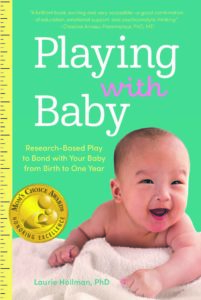5 Things Parents Can Do to Help Their Children Thrive and Excel in School
Dr. Laurie Hollman On The 5 Things Parents Can Do To Help Their Children Thrive and Excel In School

Parents need to be open and delighted to learn from their children who are growing up in a world so different than the previous generations. Parents need to revel in change, not fear it because its unfamiliar.
School is really not easy these days. Many students have been out of school for a long time because of the pandemic, and the continued disruptions and anxieties are still breaking the flow of normal learning. What can parents do to help their children thrive and excel in school, particularly during these challenging and anxiety-provoking times?
To address this, we started a new series called ‘5 Things Parents Can Do To Help Their Children Thrive and Excel In School.” In this interview series, we are talking to teachers, principals, education experts, and successful parents to learn from their insights and experience.
As a part of this interview series, I had the pleasure to interview Laurie Hollman.
Laurie Hollman, Ph.D. is a psychoanalyst with specialized clinical training in infant-parent, child, adolescent, and adult psychotherapy and is an expert on the Narcissistic Personality Disorder and Parental Intelligence. She has been on the faculties of New York University and the Society for Psychoanalytic Training and Research, among others. She is an authority on modern parent-child relationships and an award-winning author who has published seven books. She has written extensively on parenting for various publications, including the Psychoanalytic Study of the Child, The International Journal of Infant Observation, The Inner World of the Mother, Newsday’s Parents & Children Magazine and Long Island Parent in New York. She blogged for Huffington Post extensively and currently contributes articles for Thrive Global, Mind Body Green, Authority Magazine, and Upjourney. She also writes as a parenting expert for Good Housekeeping, Bustle Lifestyle, Romper, Fatherly, and others.
Her Gold Mom’s Choice Award winning book is Unlocking Parental Intelligence: Finding Meaning in Your Child’s Behavior. In 2021 her most recent arrival on the Parenting scene was: Playing with Your Baby: Research Based Play to Bond with Your Baby from Birth to One Year which received the Gold Mom’s Choice Award.
Dr. Hollman is currently using her 40 year experiences as a psychoanalyst to publish her debut novels tentatively titled, My Reflection in Your Eyes and The Dissociation of Liv.
Thank you so much for doing this with us! Before we dive in, our readers would love to “get to know you” a bit better. Can you share with us a bit about your “backstory”?
With regard to this topic, schooling or learning has been central to my life and well-being and continues to be. While the word school suggests a building I have found schooling taking place in public schools and private universities as well as one-on-one with individual expert teachers and scholars on various subjects with whom I have formed warm connections.
I’ve also discovered that schooling can take place on my own and have learned a great deal throughout my young and older life in that way. As we all have found out during the current Pandemic if not before the school building is only one location within which we can learn. I hope we can keep this in mind during the interview. Thank you.
Can you share the most interesting story that happened to you since you started your career? Can you tell us what lesson you learned from that?
Schooling has given me innumerable interesting stories since starting my career. One that I hold close to my evolution as a psychoanalyst is when I was fortunate to be part of a small group of analysts in the living room of Dr. Jacob Arlow, a renowned psychoanalyst revered in the United States and abroad.
As an active participant in this small learning group, I presented two confidential cases to Dr. Arlow for a few years as the others listened. His remarkable memory and unique talent in understanding the unconscious gave me an experience in learning that I will always reflect on. His deep understanding and specific praise for which I am deeply grateful and hope I was deserving of is undeniably the most unusual learning experience of my career. He was a brilliant and compassionate man from whom I was most fortunate to be guided by and know.
Can you please give us your favorite “Life Lesson Quote”? Can you share how that was relevant to you in your life?
I honestly don’t claim to have a favorite, but here is a great one: “The first principle is that you must not fool yourself, and you are the easiest person to fool.” –Richard P. Feynman
I offer this quote because like all human beings we struggle to learn and be open to many world views, yet I easily state that for all I try to learn about life, I believe that I’d be a fool not to admit that despite my efforts I must humbly admit that I cannot fathom how much I must fool myself! As noted above in my perpetual learning about the unconscious it is inevitable that what we consciously know is always subordinate to the unconscious realm of our minds.

You are a successful leader. Which three character traits do you think were most instrumental to your success? Can you please share a story or example for each?
Leadership is another humbling word. While I may guide others which is all a leader can do so that people think for themselves I expect that three character traits instrumental to some success have been humility, admitting the need to know more, and respect for perspectives I have yet to fathom.
Are you working on any exciting new projects now? How do you think that will help people?
My latest efforts have been to write two psychological novels that reflect the ability for humans to grow and change despite significant obstacles life sets before them. After extensive revisions if they can be published my hope is that readers will see themselves in my characters in some way meaningful to them and learn how these characters face immense challenges that can encourage others to do the same.
For the benefit of our readers, can you tell us a bit why you are an authority about how to help children succeed in school?
Before becoming a psychoanalyst, I taught elementary school attempting some innovations in the seventies that are currently practiced as others have thought of these innovations as well. For example, I created situations in a traditional classroom where children could teach other children when they demonstrated knowledge and skills in an area their peer was less knowledgeable about. Everyone had their own unique talents to share. Learners discovered they could be teachers and that young peers could learn from each other. I also created a report card based on skills learned rather than grades which offered the children and parents a direction for continued learning and progress.
I was intentionally placed in a conventional public school because the superintendent believed due to my research in educational psychology that I might introduce new ways of learning that would intrigue and animate young learners. I discovered that children learn most easily when they feel accepted and understood by their teachers rather than judged and tested. This frees them to expand their capacity for tolerating the natural frustrations that come with new learnings with relative ease because they discover that not knowing presents the anticipation and excitement of new learning that expands their world.
It’s really a simple concept that I introduced. I will give one small example.

A little quiet second grader couldn’t wrap her mind around multiplication. Compared to the other children, she unfortunately felt inadequate. Instead of having her endure feeling unable to catch on in a group, we ate lunch together and played with apples. When I simply showed her how if we took two apples and set them aside and then added a set of two more, we doubled the amount or ‘multiplied’ two sets of apples by two so there were now four shiny apples.
This concrete example in the quiet of our twosome led her to discover on her own what multiplication was all about. She had her very own “aha” moment with the glow of delight that comes with learning something she had woefully thought was beyond her. Her excitement in that understanding without any pressure or expectation gave her a view of learning as something thrilling and fun.
Ok, thank you for that. Let’s now jump to the main focus of our interview. Can you help articulate the main challenges that students face today that make it difficult to succeed in school?
The assumption behind the question as noted earlier is that schooling takes place in a building with separate classrooms for different age kids in long hallways with combination lockers and perhaps decorations on the hallway walls.
But was learning ever meant to only occur in such bounded spaces? It may just have seemed practical or efficient (such a conundrum to enforce learning to be efficient!) to create public schools with such a design to use taxes to provide schooling for all children.

Over many decades we discovered that all children were not in fact learning under these circumstances but were segregated from learning from teachers and peers with many differences from themselves, which is part of learning of course in itself. We need to learn we are not alone, that differences among people are exciting, that we can learn academic and social skills at once and that learning couldn’t be restricted to specific locations.
We discovered that kind of climate was neither conducive nor inspiring for learning.
We continue to promote integration of cultures within the walls of these buildings, aspire to give teachers more respect and educational resources, and introduce innovative curricula yet still find educational opportunities are not only unequal for all but lack inspiration for a wide range of young learners who learn differently and at worst, can even be treated punitively in some situations.
We have yet to actually define what “success” in school even means. I would hope success could mean unending inspiration to aspire to learn new ideas in fascinating ways that entail both the normal frustrations that come with not knowing and the thrilling discoveries of knowing.
Challenges are part of learning, not obstacles! Success has many meanings defined by the multitude. We have surely discovered that different children optimize learning in different ways. So how do we find environments and situations where this can occur?
Can you suggest a few reforms that you think schools should make to help students to thrive and excel?
Reforms require new ways of thinking about how children learn inside and outside the architectural structure of school buildings. New growing technology and environmental stressors like the recent Pandemic which will surely not have a specific endpoint and as such be believed to not happen again and again, clearly tell us all that learning was not mean to be isolated to physical buildings.
In my view and those of infancy researchers tells us that learning has already begun in infancy from day one if not before. We don’t isolate the baby in a building to learn! How ridiculous. The early developing brain is a wonder. The infant immediately recognizes the voice of the mother that he or she heard in utero. Why not consider that inside the body of a mother is when learning begins?

The parent and infant constantly introduce new learning to each other from the get-go. Infants and parents learn from each other at a rapid pace. To optimize infant and childhood learning first we must prize this innate biological opportunity and revel in it. If the infant is in an environment where learning is part of life itself, significant, important, and fascinating, then by the time the child is of an age when he or she may learn with peers we hope that the caretakers of these children have already made learning a second-by-second part of living.
Knowledge, like oxygen, and good nourishment must be afforded for all children all the time. If this value is imparted early on thriving becomes an implicit outcome. Excelling is individually defined and must be seen that way. Only then can we maximize the opportunities and inspirations for children to learn.
The first reform is thus in our thinking about learning by not restricting it to school buildings. Then we develop further our scientific understanding of how the brain is working in each individual. But surely we cannot wait for such results which will grow and change as we hopefully continue to evolve on this endangered planet.
So, now please ask me your very next question.
Here is our primary question. Can you please share your “5 Things Parents Can Do To Help Their Children Thrive and Excel In School?” Please share a story or example for each.
1 . Parents can instill in our children by example from infancy onwards that learning is part of life itself whether in the womb, the home, the street, the city, the countryside, and the ocean or out in space. Learning is life. Schooling is life. When parents prize learning by daily example so will their children.

2 . Parents can become involved in creating environments that open up learning to the wide range of all individual child learners by accepting with joy that each youngster may learn in both similar and different ways.
This can begin in each home of course when parents accept and applaud each of their children’s propensity to learn in unique ways. Parents can be excellent observers of how their babies and children learn and revel with them often as to the specific learnings taking place (as opposed to generic praise like “good job” and “good girl” that doesn’t tell the child exactly what they learned, how they learned it, and how to continue on their aspiring paths).
3. Make endowments in education through public and private means a major priority for parents to support at the voting booth at least in our United States including ongoing research and development in how varied children learn best.
Then make this knowledge easily and readily accessible to all parents so they can support their unique child’s desire to learn at home, online, outside and in school buildings. Parents who have not had the opportunities to make learning a joyful part of their lives growing up will benefit greatly from hearing how others optimize the learning of their children in ways they may not have known possible.
4. In everyday life as it is at this time, read real books with covers and printed paper inside everyday with your kids. Holding a book in your hands is a different experience from reading it on a screen.
Share with children the joy of owning their own actual books, highlighting passages, making their own notes in the margins, and devouring knowledge through fiction and nonfiction over and over again. Encourage them to hold books in their hands and have their own pick of what goes on their very own bookshelves.
Each time a book is reread more is learned, excitement is peaked, and children discover and create new learnings not yet discovered by those older than them.
5. Parents need to be open and delighted to learn from their children who are growing up in a world so different than the previous generations. Parents need to revel in change, not fear it because its unfamiliar.

If it is true that what people, let’s say parents, think they see in their child that makes his or her reality, then if we are not broad minded we will stifle our kids even imprison them in our limited knowledge (though kids won’t allow it — -we don’t really have to worry — -a learner can’t be held back too long!)
Ideas or even doubts about learning rise from the past experiences of parents. But the past is quickly disappearing. If as parents, we don’t face that, we’ll hold our kids back.
It’s thought that visionary thinkers leave others behind. But they don’t have to. Parents need to become more fearless so new rare minds can feel free to operate. ‘Our children are the future’ is NOT a cliché.
It’s wondrous to me, for example, how my grandchild, in his first year of high school, discovered a new way to solve a math problem introduced by his well-educated teacher. She then was fortunately open minded enough to learn from this ingenious thirteen-year-old an innovative way to solve the math problem that she initially introduced. This child was the visionary not leaving his elder behind!

Our kids think in new ways because they are so open minded that they wrap their minds around old and new learnings in fascinating ways.
As parents and professional teachers, we must be open to learn from our children experiencing the world differently than previous generations. Then with them, we can all thrive and excel.
As you know, teachers play such a huge role in shaping young lives. What would you suggest needs to be done to attract top talent to the education field?
First we have to be open to the new ways our children will grow into teachers who are now learning in their expanding world. Only then can contemporary educators invite and welcome this newly arriving top talent that will expand our world most likely in unexpected ways.
We need to look beyond what we currently know in order to seek new educators. We can’t let SAT scores and state mandated testing to remain as even an alternative to discover our emerging geniuses. Universities and colleges, nevertheless, current educators in the public and private spheres must find a new compass to discover these rare and exciting talented young people to teach and lead us.

“What’s going on in your child’s mind?”
We are blessed that some of the biggest names in Business, VC funding, Sports, and Entertainment read this column. Is there a person in the world, or in the US, with whom you would love to have a private breakfast or lunch, and why? He or she might just see this if we tag them 🙂
The biggest names may not actually be the most innovative given what I’ve written. So, thank you for the invite. But I think I’ll have lunch with my grandson!
How can our readers further follow your work online?
I welcome you to my website: https://lauriehollmanphd.com
Thank you so much for these insights! This was so inspiring!
In-depth Interviews with Authorities in Business, Pop Culture, Wellness, Social Impact, and Tech. We use interviews to draw out stories that are both empowering and actionable.
